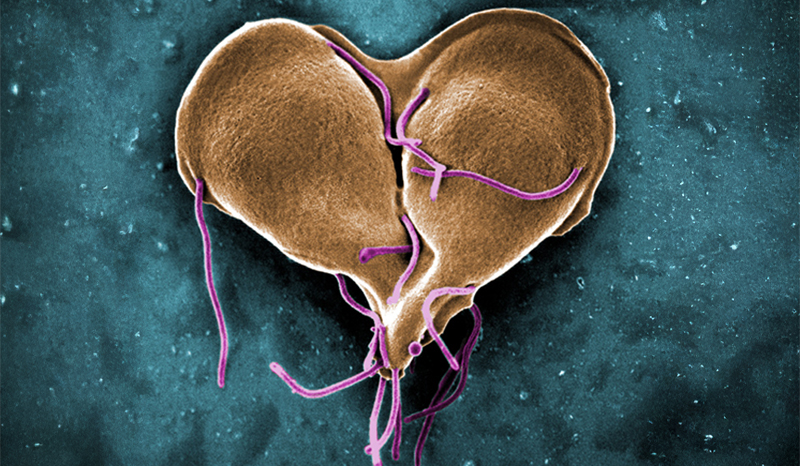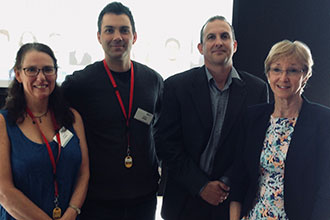Kapoor S, Hickner PV, Dickey AN, Bailey E, de Paula LCB, Belikoff EJ, Davis RJ, Tandonnet S, Canettieri CK, Bertone MA, Szpila K, Hall RS, Young ND, Korhonen PK, Gasser RB, Perry T, Jex AR, Bowles VM, Wiegmann BM, Torres TT, Anstead CA, Scott MJ. Comparative genomic analysis of necrophagous and parasitic subspecies of Lucilia cuprina (Diptera: Calliphoridae) provides important insight into their divergent biologies. International Journal for Parasitology. 2026;56(1):10.1016/j.ijpara.2025.06.001
Lam AYF, Lucet IS, Jex AR, Emery-Corbin SJ. Illuminating the druggability of the Giardia duodenalis kinome through reannotation and high-throughput screens. International Journal for Parasitology Drugs and Drug Resistance. 2025;29:10.1016/j.ijpddr.2025.100619
Tichkule S, van Oosterhout C, Cacciò SM, Weisz F, Balan B, Nohýnková E, Naung M, Ansell BRE, Emery-Corbin SJ, Baker L, Lalle M, Svärd S, Gasser RB, Jex AR. Host range expansion of asexual parasite can be explained by loss of adaptions in Muller’s Ratchet. Nature Communications. 2025;16(1):10.1038/s41467-025-65843-4
Mardahl M, Hansen EP, Fromm B, Borup A, Whitehead B, Boysen AT, Stensballe A, Andersen KL, Williams AR, Jex AR, Gasser RB, Fredholm M, Thamsborg SM, Nejsum P. Analysis of Oesophagostomum dentatum excretory-secretory molecules and extracellular vesicles uncovers a repertoire of miRNAs shared with A. suum and T. suis and ES containing Paz and Piwi domain proteins implicated in RNAi signaling. International Journal for Parasitology. 2025;:10.1016/j.ijpara.2025.10.006
Kapoor S, Young ND, Jex AR, Baxter S, Yang YT, Davies AJ, Armstrong MN, Whiteside TL, Batterham P, Gasser RB, Bowles VM, Perry T, Anstead CA. Population structure, gene flow and genetic diversity of sheep blowfly (Lucilia cuprina dorsalis) in Australia. BMC Genomics. 2025;26(1):10.1186/s12864-025-11852-y
Jex A, John N, McCarthy D, Myers S, Begue N, Schang C, Usher SP, Baker L, Kaucner C, Monis P, Hartman LM, Flynn B, Merrett JE, Lister D, Herold M, Kueh A, Cheng NN, Nolan J, Caly L, Druce J, Thorley B, Scales PJ, Schmidt J, Sarkis S, Crosbie ND, Poon R, Nolan M. Multi-tiered strategy for large-scale wastewater detection of SARS-CoV-2 in low-case settings provides confidence for public health actions. Journal of Water and Health. 2025;23(2):10.2166/wh.2025.164
Nelli F, Ge Z, Blackall L, Taheriashtiani N, Henry R, Brumley DR, Grace M, Jex A, Burch M, Lin T-F, Bertelkamp C, Willis A, Gao L, Schmidt J, Crosbie ND, Zamyadi A. Machine learning driven image segmentation and shape clustering of algal microscopic images obtained from various water types. Computational and Structural Biotechnology Reports. 2024;1:10.1016/j.csbr.2024.100014
Baldi A, Braat S, Hasan MI, Bennett C, Barrios M, Jones N, Abdul Azeez I, Wilcox S, Roy PK, Bhuiyan MSA, Ataide R, Clucas D, Larson LM, Hamadani J, Zimmermann M, Bowden R, Jex A, Biggs B-A, Pasricha S-R. Effects of iron supplements and iron-containing micronutrient powders on the gut microbiome in Bangladeshi infants: a randomized controlled trial. Nature Communications. 2024;15(1):10.1038/s41467-024-53013-x
Merrett JE, Nolan M, Hartman L, John N, Flynn B, Baker L, Schang C, McCarthy D, Lister D, Cheng NN, Crosbie N, Poon R, Jex A. Highly sensitive wastewater surveillance of SARS-CoV-2 variants by targeted next-generation amplicon sequencing provides early warning of incursion in Victoria, Australia. Applied and Environmental Microbiology. 2024;90(8):10.1128/aem.01497-23
Baldi A, Braat S, Imrul Hasan M, Bennett C, Barrios M, Jones N, Moir-Meyer G, Abdul Azeez I, Wilcox S, Saiful Alam Bhuiyan M, Ataide R, Clucas D, Harrison LC, Arifeen SE, Bowden R, Biggs B-A, Jex A, Pasricha S-R. Community use of oral antibiotics transiently reprofiles the intestinal microbiome in young Bangladeshi children. Nature Communications. 2024;15(1):10.1038/s41467-024-51326-5





